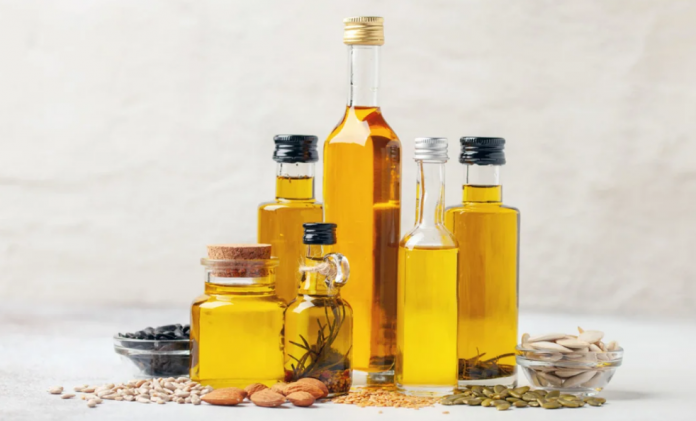There are many confusing topics in nutrition, but cooking oils top the list. Over the years, rapeseed and vegetable oils have come under a lot of pressure because they are high in unsaturated fats and low in saturated fats, but an isolated nutritional profile doesn’t always tell the whole story, and that’s especially true in this case.
If you’re trying to decide whether rapeseed oil or vegetable oil is the best option for health, or whether they’re even good for you, you might be surprised by the answer.
In This Article
- 1Canola oil
- 2Vegetable oil
- 3Which is healthier?
- 4Substitutes
What is canola oil?
Let’s start with canola oil. Canola oil is a neutral tasting oil made by crushing the seeds of the canola plant. It sounds simple enough, but there’s a lot that goes on behind the scenes to get there.
The canola plant actually originated as rapeseed, but as it stands, rapeseed contains two toxic compounds – erucic acid and glucosinolates – that are not safe to consume. According to Shahzadi Devje, R.D., CDE, MSc, a registered dietitian and diabetes educator, Canadian scientists have found a way to eliminate these compounds through targeted plant breeding and have created the canola plant (Can for Canada and ola for oil).
To make canola oil, the oil is extracted from the canola plant through a lengthy manufacturing process that uses chemicals such as hexane,” says Devje.
Canola oil has two major advantages in cooking: It has a neutral flavour that doesn’t alter the taste of what you’re cooking, and it has a high smoke point, which means it can withstand high cooking temperatures without breaking down and burning. “Rapeseed oil also contains vitamin E, vitamin K and plant sterols that promote heart health,” Devje told mbg. But the benefits end there.
What about vegetable oil?
Vegetable oil is not a specific type of oil; rather, it is a general term used for any oil derived from plants, including seeds, grains, nuts and/or fruits. That said, when we talk about “vegetable oil”, we most often think of soybean oil.
However, it should be noted that most commercial vegetable oils are actually a mixture of different types of cheap oils, including soybean and corn. Because the term “vegetable oil” is so vague, manufacturers can add a mixture of oils without being technically misleading.
Like rapeseed oil, vegetable oil has a high smoke point, a neutral flavour and a high concentration of unsaturated fats.
So, which is the healthier option?
The short answer? Neither. Aside from being highly processed and (most likely) genetically modified, the polyunsaturated fats in canola and vegetable oil are largely omega-6 fatty acids. This isn’t necessarily a problem on its own, but it becomes an issue when you look at the bigger picture.
Before industrialization and oil refining came into play, our diets were full of omega-3 fatty acids that came from wild game, wild-caught fish, plants, and natural fats. Once the focus shifted to liquid vegetable oils and farm-raised animals instead, our omega-6 consumption skyrocketed, while intake of omega-3 fatty acids started to fall short, according to functional medicine doctor Mark Hyman, M.D.
To put it into perspective, studies show that the ideal ratio of omega-6s to omega-3s is 2:1. Right now, the average American consumes 10 to 20 times more omega-6s than omega-3s (a ratio of 10:1 to 20:1).
Sure, consuming a large amount of unsaturated fats sounds good, but the problem is that omega-6 fatty acids can have pro-inflammatory effects. And unless you’re balancing it out with the anti-inflammatory properties of omega-3s, you’re not doing yourself any favors. Omega-6 fatty acids also decrease the conversion of alpha-linolenic acid (a plant-based omega-3 fat) into the active forms of omega-3 (EPA and DHA) by as much as 40%, according to Hyman.
Aside from that, canola oil is one of the least healthy oils for other reasons. It’s highly processed and usually stripped of nutrients, says nutritionist and mindbodygreen Functional Nutrition Training instructor Serena Poon, C.N., CHC, CHN.
It’s also genetically modified, which typically means there are more herbicides involved in its production, and that can have negative effects on the environment, Devje says.
Substitutes for canola or vegetable oil.
So, what oil should you use instead? According to Poon, it largely depends on what you’re doing with it. The main draw of canola and vegetable oil is their versatility, but you can use these healthier alternatives in their place.
- In cooking: avocado oil, sesame oil, coconut oil, or extra-virgin olive oil
- In frying: avocado oil, sesame oil, or peanut oil
- In dressings: flaxseed oil, pumpkin seed oil, or extra-virgin olive oil
- In baking: coconut oil or avocado oil
For baking, Poon also recommends skipping the oil altogether and opting for applesauce or mashed banana in its place. “Mashed fruits will add moisture to muffins and cakes without the processed oil or added fats and can act as a substitute for some added sugar,” she previously told mbg.
Conclusion.
It may be tempting to use rapeseed oil and/or vegetable oil because of their versatility and neutral flavour, but these oils are not doing you any favours. Forget them and opt for more nutritious alternatives instead, if you can. Coconut oil and avocado oil are good options for high temperature cooking, while olive oil is a great option for salad dressings or basting vegetables after roasting.










